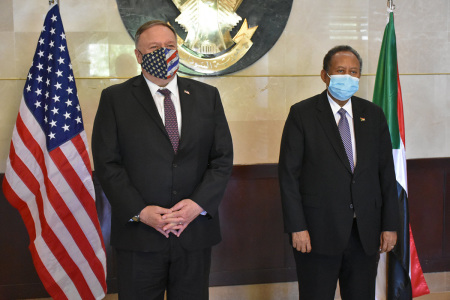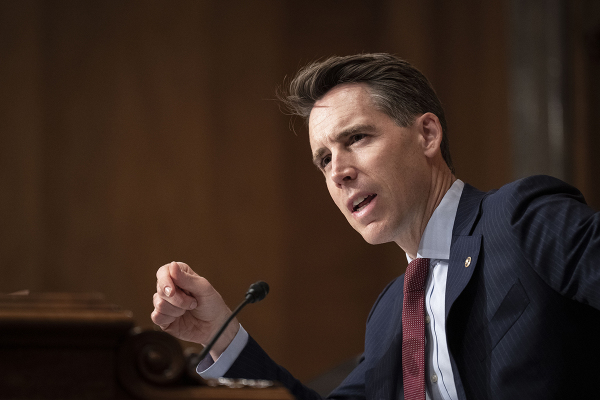Sudan now third Arab state to normalize relations with Israel in US-brokered Mideast realignment

Sudan has become the third Arab nation, after the United Arab Emirates and Bahrain, to normalize ties with the Jewish state of Israel as part of a U.S.-brokered peace agreement, called the Abraham Accords, the White House has announced.
“They are choosing a future in which Arabs and Israelis, Muslims, Jews, and Christians can live together, pray together, and dream together, side by side, in harmony, community, and peace,” President Trump said in a statement released by the White House Friday.
According to the statement, Israel and Sudan will begin negotiations in the coming weeks on cooperation agreements in agriculture, economy, trade, aviation, migration issues, and other mutual benefit areas.
“Congrats to @POTUS@realDonaldTrump on this ASTONISHING, HISTORIC DIPLOMATIC ACHIEVEMENT,” Johnnie Moore, a prominent religious freedom advocate and founder of the KAIROS Company, tweeted. “The actual Arab boycott of Israel in 1967 was called ‘The Khartoum Resolution.’ Today, from Khartoum, the United States has brokered peace between the Sudan & Israel.”
After decades of living under a brutal Islamist dictatorship “that supported terrorism, the people of Sudan are in charge and democracy is taking root,” the White House added.
The deal “carries symbolic value for Israel, since Khartoum hosted the famous 1967 Arab League summit in which eight Arab nations approved what became known as the ‘Three Nos’ — no peace with Israel, no recognition of Israel and no negotiations with Israel,” The Wall Street Journal noted, adding that it will help Sudan revive an economy on the brink of collapse.
The U.S. Commission on International Religious Freedom cautiously acknowledged improvements in Sudan’s religious and political atmosphere after the commission’s Chair, Tony Perkins, visited Sudan in February.
“We are grateful to Prime Minister Hamdok and other members of the country’s bold transitional leadership who met with USCIRF to convey their explicit desire to bring a new era of openness and inclusivity to their country that suffered for 30 years under brutal and autocratic religious repression,” he said at the time, according to Crux.
“At the same time, we understand that the country’s challenges are deeply-rooted, and we urge the leadership to move quickly to turn that optimism into tangible and meaningful reforms for all people across Sudan, such as acting to formally repeal Article 126 of the 1991 penal code, which outlaws apostasy,” he added.
The officials also shared at the time how they planned to expand religious freedom in a country that is ranked as the seventh-worst in the world when it comes to Christian persecution, according to Open Doors USA’s World Watch List.
Last month, a member of the Norwegian Parliament, Christian Tybring-Gjedde, nominated Trump for the 2021 Nobel Peace Prize, citing his work in helping to broker a historic peace agreement between Israel and the United Arab Emirates.
“Today I have nominated U.S. President Donald Trump for the Nobel Peace Prize,” Tybring-Gjedde announced on Facebook at the time.
“The agreement can open for lasting peace between several Arab countries and Israel,” he explained. “It is now to hope that the Nobel Committee is able to consider what Trump has achieved internationally and that it does not stumble in established prejudice against the U.S. President. In his will, Alfred Nobel set three criteria to qualify for the Nobel Peace Prize. Donald Trump satisfies all three.”
Within a month, Bahrain, a small nation-state comprising a small archipelago of 40 islands in the Persian Gulf with approximately 1.5 million people, also normalized ties with Israel.
In a joint statement, Israeli Prime Minister Benjamin Netanyahu and Bahraini King Hamad bin Isa Al Khalifa said: “Opening direct dialogue and ties between these two dynamic societies and advanced economies will continue the positive transformation of the Middle East and increase stability, security, and prosperity in the region.”
Bahrain is situated between the Qatari peninsula and the northeastern Saudi Arabian coast and is home to the U.S. Navy’s regional headquarters.
Last month, U.S.-brokered talks also led to the leaders of the rival nations of Serbia and Kosovo to normalize their economic ties after decades of dispute, after which Trump was nominated for the Nobel Peace Prize for a second time.
“I have nominated the U.S. Gov. and the governments of Kosovo and Serbia for the Nobel Peace Prize for their joint work for peace and economic development, through the cooperation agreement signed in the White House,” Member of Parliament from Sweden, Magnus Jacobsson, announced on Twitter at the time, with a copy of the full letter supporting Trump’s nomination.
“Trade and communications are important building blocks for peace,” Jacobsson added.





















